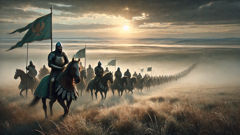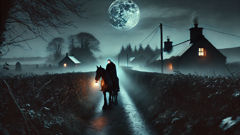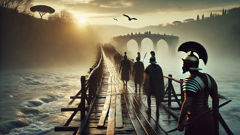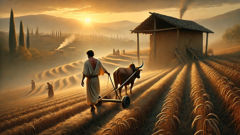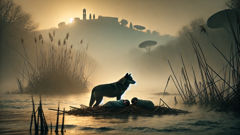Introduction
Beneath the restless skies of the medieval Russian steppe, where riverbanks curl like silver ribbons through the grasslands and the wind carries distant echoes of hooves and steel, legends took root and grew into mighty oaks of memory. Here, in the land of birch forests and wide, wild meadows, the name of Prince Igor Svyatoslavich is spoken with reverence and sorrow. The tales of his daring raid against the Polovtsian nomads have long passed from father to son, inked in the language of poets, etched into the folk memory like scars upon the earth.
To the east, the Polovtsians—a people of swift horses and burning eyes—cast their shadow over the frontiers of Kievan Rus’, their raids a constant threat against settlements and traders along the winding Don. Prince Igor, young yet seasoned, ruler of the northern city of Novgorod-Seversky, saw in these incursions both an insult and an invitation—a call to test his courage against the tide of fate. With his brother Vsevolod and a host of seasoned boyars, Igor gathered his banners under the pale spring sun. The clatter of armor, the bracing cold that clung even as winter surrendered, and the restless hope that sang in every heart set the stage for an expedition that would echo through the centuries.
As the snow receded and the land awoke with the trembling green of new growth, so too did ambition stir in Igor’s breast. He vowed not only to defend his lands but to strike deep into the Polovtsian heart, to bring glory to Rus’ and ensure that the east would remember the strength of his people. His knights, fierce as wolves and loyal as kin, swore oaths beneath cathedral arches and in the open fields. Yet, as they pressed on, their journey would reveal the treacherous edge of hope—the thin line between legend and loss, between the world as it is and the world as it is remembered.
This is the story of Igor’s campaign: a saga of courage set upon the endless steppe, where faith, fate, and the ferocity of men collide beneath the watchful gaze of ancient skies.
Banners over the Steppe: The Gathering Storm
The wind that swept across Novgorod-Seversky that spring was thick with anticipation. In the city’s wooden halls, Igor Svyatoslavich conferred with his brother Vsevolod, the two men’s voices low and urgent as they pored over maps marked with the rivers and rolling grasslands of the steppe. The threat was as old as the borderlands themselves: Polovtsian riders, their arrows swift as hawks, their fires a constant menace at the edge of civilization. For years, the principalities of Rus’ had withstood their raids—sometimes with might, more often with uneasy truces and costly tributes.
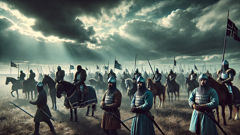
Igor was determined to end this cycle. He called forth his boyars and druzhina, each man a seasoned warrior—men who’d grown up on tales of great deeds, who bore scars from past battles. Messengers went north to Kursk and beyond, summoning allies. Vsevolod, younger yet as fierce as any, arrived with his own contingent: men of bold hearts and quick blades, eager for glory. In the city’s square, beneath the icons and banners, they took oaths: to ride east, to strike swiftly and without mercy, to return with honor or not at all.
Mothers and wives watched in silence as armor was fitted, horses shod, and supplies gathered. The clangor of preparation rang across Novgorod-Seversky. Ivan the Old, Igor’s chief adviser, warned of omens—a lunar eclipse, the restless crows gathering near the river. Yet no man would sway Igor from his course.
When dawn came, the army assembled at the city’s gate. Igor rode at their head, his helm catching the first rays of sunlight, his standard bearing the falcon and cross. Drums beat out a steady rhythm as they set off toward the Don. Fields gave way to forest, and then to the trembling expanse of the open steppe. The men rode in tight ranks, the laughter of youth still on their lips, but a heaviness settling in their eyes as the landscape grew emptier, the wind sharper.
For days they pressed on, the sky a shifting tapestry—sometimes a blue so deep it seemed endless, sometimes a bruised twilight heavy with rain. They passed the ruins of old watchtowers and the blackened bones of villages abandoned after Polovtsian raids. The world seemed to narrow to the thud of hooves, the creak of saddle leather, the breath of horses and men joined in purpose.
By night, campfires blazed beneath the stars. Igor walked among his men, sharing bread and stories, promising swift victory. He listened to the scouts’ reports: Polovtsian outriders had been seen to the east, their banners unfamiliar, their numbers unclear. Yet the army pressed on, for honor demanded nothing less.
On the fifth day, with dawn just beginning to gild the sky, the scouts returned with news: a Polovtsian camp lay hidden in a hollow by the river. Igor gave the order to ready arms and armor; the time had come to strike. As the men tightened their ranks and whispered prayers, thunder rumbled on the horizon—a warning, or perhaps a blessing. The battle that would shape legends was at hand.
The Clash at the Don: Valor and Betrayal
The morning of battle dawned cold and sharp, the air trembling with tension. Igor’s host, hidden by willow thickets along the riverbank, waited for his signal. Across the water, the Polovtsian camp woke unaware: tents striped with bright colors, horses grazing, smoke rising from small fires. In that moment before violence, even the river seemed to hold its breath.
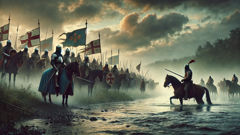
With a gesture, Igor sent his best archers forward. Arrows arced across the river, their tips catching the sun before vanishing into the enemy ranks. Shouts rose—first in confusion, then in alarm. As the Polovtsians scrambled to arm themselves, Igor’s knights thundered across a narrow ford, lances lowered. The clash was sudden and terrible: iron meeting bone, battle cries lost in the roar of horses and steel.
For hours the fight ebbed and flowed. Igor’s men, outnumbered yet fierce, pressed deep into the Polovtsian ranks. Vsevolod cut a path through enemy warriors, his blade flashing with every stroke. Ivan the Old rallied faltering men, his voice rising above the din. The Polovtsian chieftain, Konchak, rallied his own—a giant of a man, his presence like a stormcloud over the field.
Victory seemed possible. The Polovtsians began to falter, their lines breaking beneath the relentless charge of Igor’s druzhina. Yet as noon approached, disaster struck: a detachment of Polovtsian cavalry appeared on Igor’s left flank. They’d crossed the river miles upstream during the night, aided by a Rus’ traitor who’d sold secrets for gold. The knights on that side crumbled under the sudden onslaught. Panic rippled through the ranks.
Igor, seeing his men falter, rode to rally them. He shouted for courage, reminding them of their oaths. But the Polovtsians pressed their advantage; arrows filled the sky, horses screamed, men fell into the mud and reeds. Vsevolod, wounded but unbroken, refused to yield, carving out a ring of steel with his remaining men.
By afternoon, the battlefield was a chaos of mud, blood, and broken dreams. Igor’s banners fell one by one. He fought on, surrounded by loyal boyars—some from distant lands, some kin by blood or oath—until he was finally pulled from his horse, bound, and dragged before Konchak. Vsevolod was captured soon after, defiant to the end. The remnants of the Rus’ army fled into the marshes or surrendered.
As twilight descended, Konchak surveyed his victory. Fires burned through the camp; the river ran red. Igor and Vsevolod were paraded before the Polovtsian chiefs, humiliated yet unbowed. The price of valor was clear: defeat, captivity, and the dark uncertainty of what would follow.
Captivity and the Cry of Rus’
Night settled over the battlefield in silence so deep it seemed to swallow the world. The Polovtsians celebrated with wild feasts, singing songs that echoed across the plains, their victory complete. Bound and weary, Igor and Vsevolod were led to a tent at the edge of camp—a place half-lit by firelight, heavy with the scent of sweat and horse.
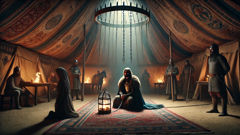
Konchak regarded his prisoners with a mixture of respect and contempt. He saw in Igor not just an enemy, but a prince whose defeat would echo through Rus’ like a warning bell. Yet, in these steppe traditions, captives were often valuable for ransom or alliance. For days, Igor endured humiliation—forced to watch his men paraded in chains, to listen as Polovtsian bards sang of his defeat. Vsevolod, ever defiant, spat back at his captors, refusing to bow his head.
Yet even in despair, hope flickered. At night, Igor spoke quietly with Ivan the Old and a handful of surviving boyars. He remembered his father’s teachings—that courage must outlast defeat, that the soul of Rus’ was not held in chains. Rumors trickled into camp: Novgorod-Seversky had not fallen; his wife Yaroslavna prayed for him at city walls, her voice carried on the wind to the very banks of the Don. Old women in distant villages sang laments for lost sons and begged the gods for Igor’s return.
Within days, negotiations began. Konchak, clever and patient, weighed his options: he could ransom Igor for gold and peace—or use him as a tool to fracture Rus’ further. Yet Igor watched and waited, feigning resignation while he studied the camp’s routines. He won the sympathy of a Polovtsian chieftain’s daughter, Maria—herself a captive from a northern raid—who brought him scraps of food and news from the wider world.
The days stretched into weeks. Igor’s health faltered but his resolve did not. At night, he prayed beneath the foreign stars and remembered the rivers and woods of his homeland. In dreams, he saw Yaroslavna weeping at dawn, her voice rising above the wind—a lament for her lost love and her threatened land. The fate of Rus’ seemed to rest not only on swords, but on courage that could endure captivity.
Conclusion
As spring melted into summer and the Polovtsian plains blossomed with wildflowers and new grass, hope returned to Igor’s heart. One moonless night, with Maria’s help and the blessing of fate, he slipped his bonds and fled the camp, guided by starlight and the distant memory of his homeland. He moved through reed beds and shadowed woods, avoiding patrols by day and pressing onward by night. Hunger gnawed at him; fatigue blurred the edges of reality. Yet Igor pressed on, driven by the promise of home and the longing in Yaroslavna’s lament.
When at last he crossed the rivers and forests that had marked his journey eastward, he was met by loyal peasants who hid him from Polovtsian scouts and tended his wounds. Word spread quickly: Prince Igor had returned. In Novgorod-Seversky, bells rang out and crowds wept for joy. Yaroslavna embraced her husband at the city gates, her prayers answered at last. Igor, gaunt and changed by suffering, stood before his people—a living legend forged in the crucible of defeat.
Though his campaign had ended in ruin, Igor’s courage endured. His story traveled from campfires to courts, a warning and a beacon for future generations. The lay that bears his name became not only a record of sorrow but a testament to the indomitable spirit of Rus’. In memory, he became both hero and caution—a prince who dared to challenge fate, whose losses shaped the destiny of a land forever balanced between hope and despair.

